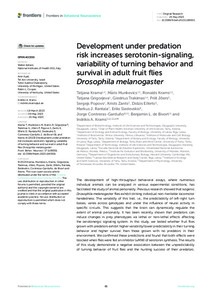Development under predation risk increases serotonin-signaling, variability of turning behavior and survival in adult fruit flies Drosophila melanogaster
Krama Tatjana; Munkevics Maris; Krams Ronalds; Grigorjeva Tatjana; Trakimas Giedrius; Joers Priit; Popovs Sergejs; Zants Krists; Elferts Didzis; Rantala Markus J.; Sledevskis Eriks; Contreras-Garduño Jorge; de Bivort Benjamin L.; Krams Indrikis A.
https://urn.fi/URN:NBN:fi-fe2025082787378
Tiivistelmä
The development of high-throughput behavioral assays, where numerous individual animals can be analyzed in various experimental conditions, has facilitated the study of animal personality. Previous research showed that isogenic Drosophila melanogaster flies exhibit striking individual non-heritable locomotor handedness. The variability of this trait, i.e., the predictability of left-right turn biases, varies across genotypes and under the influence of neural activity in specific circuits. This suggests that the brain can dynamically regulate the extent of animal personality. It has been recently shown that predators can induce changes in prey phenotypes via lethal or non-lethal effects affecting the serotonergic signaling system. In this study, we tested whether fruit flies grown with predators exhibit higher variability/lower predictability in their turning behavior and higher survival than those grown with no predators in their environment. We confirmed these predictions and found that both effects were blocked when flies were fed an inhibitor (alpha MW) of serotonin synthesis. The results of this study demonstrate a negative association between the unpredictability of turning behavior of fruit flies and the hunting success of their predators. We also show that the neurotransmitter serotonin controls predator-induced changes in the turning variability of fruit flies, regulating the dynamic control of behavioral predictability.
Kokoelmat
- Rinnakkaistallenteet [27094]
